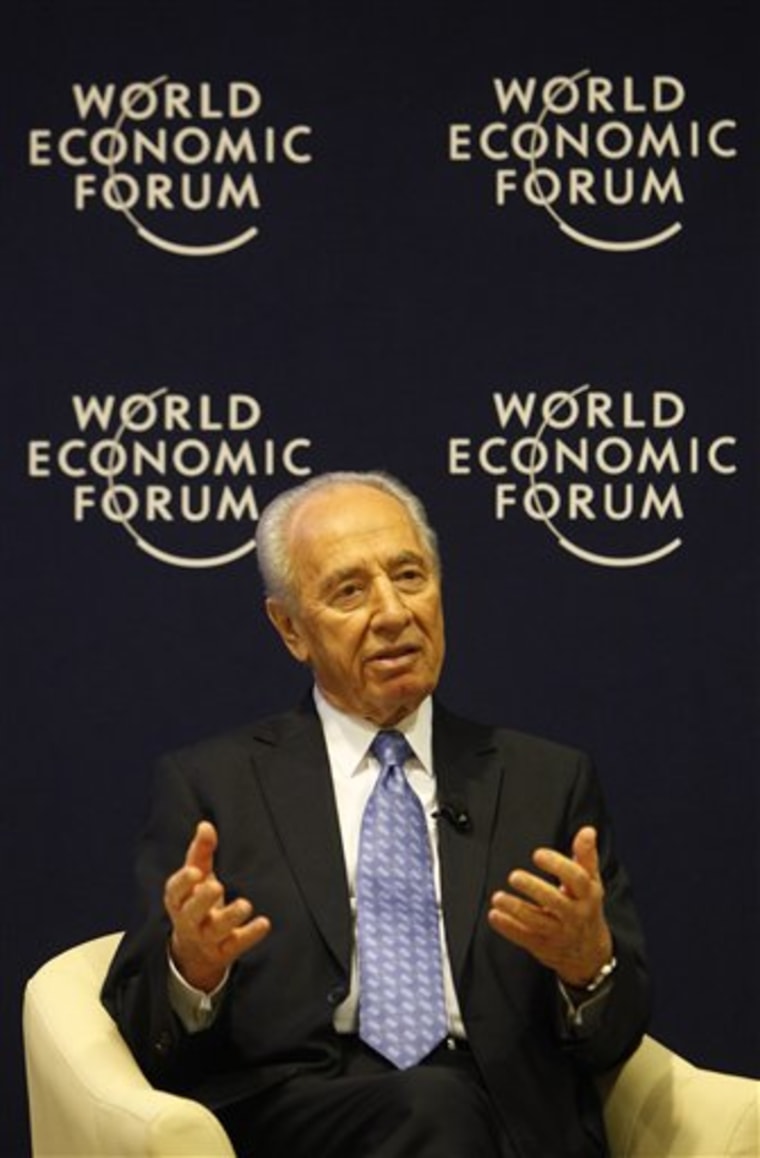Israel's president urged Syria Sunday to open direct peace talks, saying any gesture by the Damascus government would help clear the air between the two arch enemies.
President Shimon Peres, a Nobel Peace Prize winner whose office is largely ceremonial, also told reporters in Jordan that Israeli Prime Minister Benjamin Netanyahu would abide by agreements signed by his predecessors, including a U.S.-backed Mideast peace plan calling for a two-state solution to the conflict with Palestinians.
Peres said some had suggested Syrian President Bashar Assad and Netanyahu meet and start talking directly.
"The Syrians should be ready to talk. If President Assad wants peace, why is he shy?" he said after participating in an international economic meeting sponsored by the Geneva-based World Economic Forum. "We suggested many times direct talks," Peres added. "He thinks direct talks are a prize to Israel. It's not a prize. It's normal."
Indirect negotiations last year
Israel and Syria conducted indirect peace negotiations through Turkish mediators last year. But Syria suspended them over Israel's Gaza war in December and January. Peres said the Syrians have been trying to get the United States involved as an intermediary in the indirect talks but he did not believe the contact through Turkey had resumed.
"Right now, I don't think there's anything happening," he said, pointing to Israel's preoccupation with elections that brought right-wing Likud leader Netanyahu to office in March.
Syria is demanding that Israel agree to return the entire Golan Heights, territory captured in the 1967 Mideast war, in any peace deal. Assad said last week he did not think the new hard-line Israeli government was a good partner for the peace talks.
And just a few days ago, Netanyahu said he would not return the Golan.
Peres said a gesture by Syria would be more important than all the negotiations.
"Change the air," he said. "There stands the president and he said he doesn't want to meet. Why? You want us to give back something, but he doesn't suggest to give us back anything," Peres said.
Earlier, the Israeli president met with Jordan's King Abdullah II behind closed doors at the conference. A royal palace statement said Abdullah urged Peres to assist in efforts to have Netanyahu's government "quickly launch negotiations to resolve the Palestinian-Israeli conflict based on a two-state solution."
'Very constructive, friendly and warm'
Peres said his talks with Abdullah were "very constructive, friendly and warm" and that he "sees eye-to-eye" with the king, especially on his call for a swift settlement to the lingering Arab-Israeli conflict.
"We want peace, we don't consider the Palestinians as our enemy, but our friends and neighbors," Peres said. "We don't consider Islam our enemy."
Ahead of Netanyahu's meeting the President Barack Obama on Monday, Peres declined to say whether Netanyahu would endorse outright the two-state solution. Netanyahu has not done so since his election six months ago.
"I don't want to speak on behalf of the prime minister," he said. But he noted that Netanyahu has said he would abide by his predecessor Ehud Barak's commitment to a U.S.-backed peace plan that calls for a Palestinian state.
Peres insisted that progress depended on an end to terror attacks by Hamas militants and greater Palestinian efforts to ensure Israel's security.
Abdullah has previously said the only way to achieve a Mideast settlement is through a 2002 Arab peace initiative that offers Israel relations with the 23 Arab League members in exchange for its withdrawal from land it occupied in the 1967 war, a just solution for Palestinian refugees and the establishment of a Palestinian state with east Jerusalem as its capital.
Abdullah conveyed the message to Netanyahu when they met in Amman on Thursday. But the Israeli prime minister argues that the threat from Iran and its regional proxies — Hezbollah in Lebanon and Hamas in the Gaza Strip — must be confronted before any progress can be on peace.
Netanyahu has been trying to forge cooperation with moderate Arab nations to pursue that agenda, but he has pointedly refused to endorse Palestinian statehood or the Arab peace initiative.
